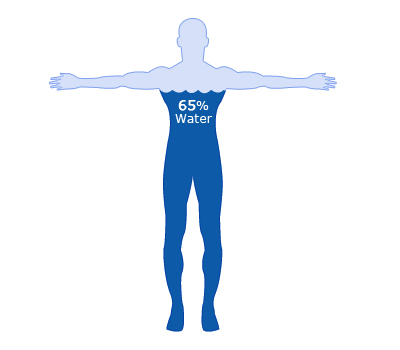Why we need food?
We all enjoy and eat food but why do we need it and what does our body do with it? Below are some of the main reasons why we need food.
- For energy
You need food to work your muscles and other body organs. Food is the body’s fuel that keeps it going, without it the body would not work. - For growth and repair
In order for your body to grow you need to make new cells. New cells are also needed to replace old or damaged cells. Your body makes these new cells from the chemicals in your food. - To stay healthy
There are lots of reactions taking place in the cells of your body to keep you healthy and keep your body working. Certain chemicals are needed for these reactions which can only be taken in from the food you eat.
A Balanced Diet
In order to maintain healthy our body must have a healthy and balanced diet. This means we must eat sufficient food and also eat a variety of foods, this way our body gets all the different nutrients it needs.
There are seven nutrition groups found in the food we eat, these are:
- Carbohydrates
- Proteins
- Fat
- Fibre
- Vitamins
- Minerals
- Water
A balanced diet is made up of all of the above nutrients.
Carbohydrates
We need carbohydrates to give us energy. Starch and sugars such as glucose, sucrose and lactose are all carbohydrates. Starch is a large molecule made up of lots of smaller glucose molecules joined together.
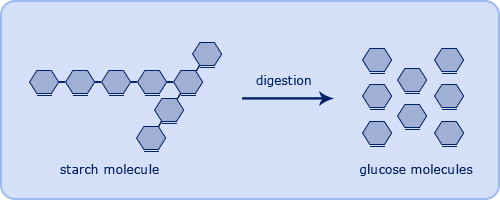
Plants turn their glucose into starch and store it for when they need it.
Glycogen is a large carbohydrate molecule like starch. It is also made up of glucose molecules joined together. Animals store glucose as glycogen in our liver and muscles, our body turns glycogen into glucose when we need it for energy.
The foods below are a good source of carbohydrate.

Proteins
Your body is made up of millions of cells. These cells are mostly made up of protein. Our body needs protein to make new cells during growth and to replace old or damaged cells. Proteins are made up of lots of smaller amino acids joined together; there are about 20 different types of amino acids. The foods below are rich in protein.

Children especially need a lot of protein in their diets as they are growing, however there are many children around the world whose diets are deficient in protein, and as a result they suffer from illness. Kwashiorkor is a protein deficiency disorder in many developing countries. This occurs because people’s diets mainly consist of starchy vegetables and in particular they do not get enough animal protein which contains the essential amino acids required by the body.
Fat
Fats are made up of 3 fatty acids joined to a single glycerol molecule.
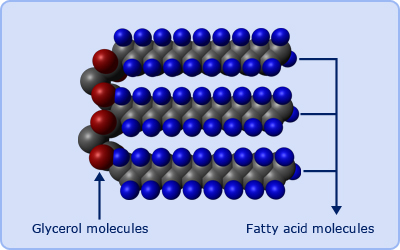
We need fats to give us energy. In fact, fats contain more energy than carbohydrates. Our body uses fat as a store of energy. Fat is stored under the skin and around the heart and kidneys. Fats are also needed for warmth (insulation) as they reduce heat loss from the body. Below are the foods which are high in fat.

However fats can also be bad for us. There are two types of fats, saturated fat and unsaturated fat. Fat that comes from animals is saturated fat and that which comes from plants is unsaturated. Cholesterol is a fatty deposit which is made in the liver and found in blood. The level of cholesterol in blood is influenced by the amount and type of fat in our diet. Saturated fats increase blood cholesterol levels and unsaturated fats reduce blood cholesterol levels. If we eat too much saturated fat, levels of cholesterol increase and this cholesterol will begin to stick to the lining of our arteries and over time build up. This makes the arteries narrower and our heart has to work harder to push the blood through the narrow vessels. This in turn can lead to an increase in the risk of heart disease and heart attacks.
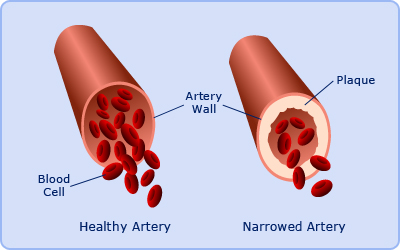
Genetic factors, smoking and alcohol consumption also contribute to the effects of cholesterol and also increase the risk of heart disease.
Fibre
Fibre or roughage comes from plants, it is essentially the cellulose from the plant cell walls. Foods that are high in fibre include bran cereals, sweetcorn and celery.
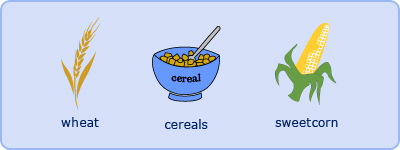
Fibre cannot actually be digested, however, it is an important part of our diet for various reasons:
- As it remains undigested it passes through the entire gut from mouth to anus and thus keeps food moving smoothly through our system.
- It prevents constipation.
- The fibre absorbs poisonous waste from the digesting food.
- High fibre diets are believed to reduce the risk of heart disease, bowel cancer and cholesterol in the body.
Vitamins and Minerals
We only need a small amount of vitamins and minerals in our diet but these are essential for good health. If they are missing we can become ill. Deficiency diseases are caused when the body does not have enough of a certain type of vitamin or mineral e.g. anaemia is caused by lack of the mineral iron. These deficiencies are easily cured by eating the right kinds of food. Vitamins and minerals can be found in fruit, vegetables and cereals.
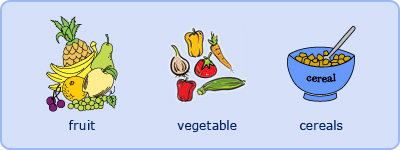
Salt is sodium chloride and is required in small amounts in our diet. On average an adult needs 6 grams per day, however many people are consuming 60% more than this. Salt is naturally found in many types of food but particularly high levels can be found in processed food such as biscuits, crisps and cereals. Too much salt in the diet is linked to heart disease, high blood pressure and strokes.
Water
Water makes up roughly 65% of our body weight. We take in water when we eat and drink. Water is important because:
- Chemical reactions in our cells take place in water.
- Waste products are passed out of our bodies in water.
- Our blood transports substances that are dissolved in water
- Water is in sweat that cools us down
